Parametry
Více o knize
Many new technologies in logistics, such as RFID, GPS, and sensor networks, are rooted in the concept of autonomous cooperation and control, which involves decentralized decision-making in heterarchical structures. This approach assumes that interacting elements in non-deterministic systems can make decisions, aiming to enhance the robustness and positive emergence of the overall system by enabling distributed and flexible responses to complexity and dynamics (Hülsmann & Windt, 2007). This edited volume explores the contributions and limitations of applying these principles to logistics processes and systems. It seeks to identify, describe, and explain the impacts on performance and robustness within production and distribution logistics, as well as the enablers and constraints affecting feasibility. The work examines essential cause-effect relationships related to concepts, methods, technologies, and routines of autonomous cooperation and control. Ultimately, the analyses aim to establish a framework to determine the optimal degree and boundaries of autonomous cooperation and control in logistics, drawing insights from production technology, electronics and communication engineering, informatics and mathematics, as well as management sciences and economics.
Nákup knihy
Autonomous Cooperation and Control on Logistics, Kolektiv autorů
- Jazyk
- Rok vydání
- 2011
- product-detail.submit-box.info.binding
- (pevná)
Doručení
Platební metody
Tady nám chybí tvá recenze.


